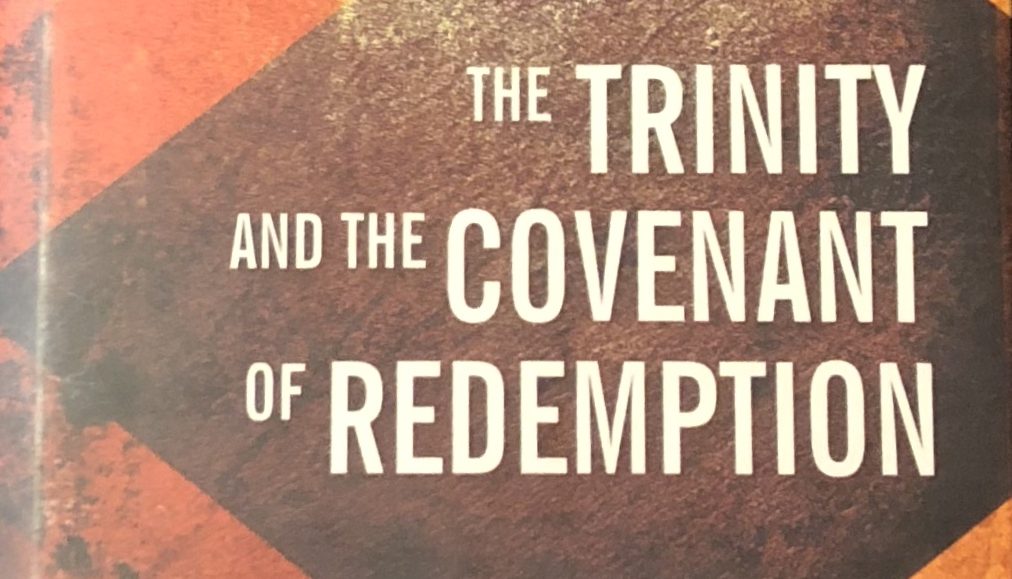The Trinity and the Covenant of Redemption
by J. V. Fesko, 414 pages. Publisher: Mentor.
Overview
Rating: 4/5.
The main point: The gospel was always the triune God’s plan ‘A’ for the salvation of sinners. The Father, Son, and Holy Spirit made a covenant in eternity past to redeem sinners. This should drive believers to praise God in awe of His glorious grace.
Who should read this book? This book is for any Christian, seasoned pastor, or student of theology who wants to better understand the doctrine of the covenant of redemption as taught by historic Covenant Theology. There are some Greek and Hebrew terms, but most are translated or the meaning is inferred. The book is written at a somewhat scholarly level but should not be too difficult to follow along with.
Summary

In The Trinity and the Covenant of Redemption, J. V. Fesko defends the historic doctrine of the covenant of redemption, also known as the “pactum salutis.” This is the idea that there was a pact or covenant amongst the persons of the Trinity back in eternity past. The Father covenanted to send the Son and Holy Spirit. The Son covenanted to take on flesh in the incarnation, to keep the law perfectly, and to die on the cross on behalf of sinners. The Holy Spirit covenanted to be sent by the Father and Son to apply the work of the Son, effectually calling and bringing sinners to salvation.
Analysis
Covenantal or Dispensational?
For anyone who has studied and wrestled with the deep questions of God, it eventually becomes clear that there are basically two major camps in protestant evangelical theology. These have become known as Covenant theology (CT from here on) and Dispensational theology (DT). Of course, most of us do not fall neatly into one camp or the other. That being said, it can be helpful to understand the differences. Questions about the nature of God, Scripture, and how salvation works can and should impact your views of which camp has it right. At the same time, I am convinced that this is an in-house debate amongst faithful Christians.
Rigorous Charity and Charitable Rigor
Both CT and DT affirm the doctrines of the Trinity, the divine inspiration of Scripture, and that salvation is found only when sinners place their personal faith in Jesus Christ. For that we should be thankful and seek to be clear but charitable in our discussions. We may not be burning each other at the stake over these issues anymore, but spend long enough on social media and you will see plenty of digital blood being spilled over them. Again, these are important issues and as someone once put it, we should be gentle with people but ruthless with ideas.
Is This Something New?
It’s been said that if it’s new, it’s not true, and therefore, we should recognize that truth is very old. Covenant theology is commonly associated with Reformed Paedobaptists, so may be surprising for some within my own Baptist tradition to learn that there have also been Credobaptist Covenant theologians for hundreds of years. The 2nd London Baptist Confession of 1689 is explicitly covenantal and affirms the covenant of redemption. The same goes for the minutes and confessions of faith from the Baptist associations where I live in Georgia going back to 1700s. Famous Baptists like Charles Spurgeon in the 1800s and A.W. Pink in the 1900s were also unashamedly Covenantal in their theology and believed in the doctrine of the covenant of redemption.
Are We Eternally Justified?
In Fesko’s work, he dedicates Part I of the book to “Historical Origins and Development”. One of the historical nuggets he deals with was particularly interesting to me as a Baptist. Fesko addresses the error of “eternal justification,” which is not the same as what we mean when we talk about “eternal life.” Eternal justification is the idea that the elect have always been justified before God. In other words, the claim is that if you are saved, you were never not justified. Fesko identifies no less than Jonathan Edwards and John Gill as two theologians who held to this view. Fans of Charles Spurgeon will recognize Gill as Spurgeon’s predecessor at the New Park Street Chapel. Fesko gives a clear explanation for why eternal justification is an error to be avoided and is not what the covenant of redemption teaches. He rightly explains that although every believer was chosen in Christ before the foundation of the world, they are also born as timebound sinners who were once far off and had to be justified by faith in the completed work of Christ in actual time and history.
Okay, but Does the Bible Actually Teach This?
Part II of the book deals with the “Exegetical Foundations” of the covenant of redemption. Fesko goes in depth with specific passages of scripture but also makes it clear that he believes the doctrine is taught by the Bible as a whole. He focuses on Zechariah 6:13, Psalm 2:7, Psalm 110, Ephesians, 1 Timothy, and 2 Timothy 1:9–10. In Fesko’s view, Psalm 2:7 provides the “subterranean root system” that supports the doctrine of the covenant of redemption.
In one of the strongest arguments for the covenant of redemption, Fesko deals with Psalm 110, which the New Testament applies to Jesus in several places. He says, “Those who correctly identify Jesus as the proper subject of this psalm must acknowledge that Scripture records no historical event when Yahweh uttered this covenantal oath to Jesus.” (pg. 103). He points out that Jesus tells his disciples in Luke 22:29 that the Father promised him a kingdom. Not only that, but in Luke 22:69 Jesus said that He would be seated at the right hand of the Father. Both of those promises are referenced in Psalm 110. Fesko goes on to reason that since “we possess no recorded historical event where this covenantal bond was initiated, we are naturally forced to look backward into eternity for the timeframe of this event.” Some readers will not agree with him on this point but it touches on the danger of the “word-concept fallacy.” In other words, it is not valid to claim that concepts such as the doctrine of the Trinity are not biblical just because the word “Trinity” itself is not actually in the Bible. A concept can be taught and affirmed even if the word itself is not there.
Theological Objections Answered
In Part III “Dogmatic Construction”, Fesko looks at the covenant of redemption from a systematic theology perspective. Throughout this section, he refutes the objection that the doctrine makes salvation just a cold piece of business or modern legal contract by God. At several points, he insists that the covenant of redemption is grounded in God’s love. The fact that this love is connected to obedience does not make it any less loving. Of course, 1 John 4:8 tells us that God does not just show or offer love, He “is love.” A lot of people (including non-Christians) will simply say “God is love,” but they forget or don’t know the full context. John goes on to say in verse 10 that God “sent his Son to be the propitiation,” the wrath-removing sacrifice for our sins. Without the Son’s obedience to the Father, that wrath would remain on every single one of us.
The questions raised by this book touch on just about every heavy question that theologians have tried to tackle. Although he does not explicitly make reference to the recent debates over so-called “eternal functional subordination” (EFS) of the Son, Fesko makes points in opposition to the claims of the EFS view. Those who have concerns about theologians like N. T. Wright and the “New Perspective on Paul” will also be interested in Fesko’s critiques of that movement in this book. As if that were not enough, Fesko touches on how the covenant of redemption can be affirmed while avoiding tritheism, modalism, and Socinianism. To put it simply, this is a serious theological book, but it is worth the effort to understand what is being said.
Conclusion
Several years ago, I was at a church that had invited a guest preacher to come speak to a class I was in. The guest preacher was talking about how Christians should seek to have a passionate love for God and want to be in His presence all the time. So far so good. Then he said something that shocked many of us. He said that too many Christians get overly focused on trying to commune with God through the Bible. He described a husband sitting up in bed with his wife and as they begin to get, um, “passionate,” the husband reaches for a romance novel and ignores his wife. Yes, this man actually compared Scripture to mommy-porn. The guest preacher had apparently not been properly vetted before being invited and thankfully we never saw him again. I later talked to a wise older teacher in our church about it, and we agreed the guest preacher’s comments were troubling to say the least. Comparing the Bible to a romance novel is a horrible analogy. The Bible is not just a book about God in the way that a romance novel is supposedly about romance and intimacy. The Bible is God’s word to us.
There is the objection that we cannot know if there was a covenant of redemption made within the Trinity in eternity past. The argument is that God, the divine being, is like an actor on a stage in a theater play. We are limited to what is presented to us in the play itself as it is presented to us (pp. 157, 159). J. V. Fesko dismantles that argument by rejecting the premise. He asks, “What if the actor plays himself?” What if the actor comes and sits down for an interview and explains the meaning of the play? (pp. 160–161) This was extremely helpful to me as I remembered that guest preacher. What if I were physically separated from my wife but still married and committed to her and she wrote to me? I would excitedly read and re-read what she wrote to me. I would trust that she carefully chose every word in that letter out of her love for me. I would do everything I could to understand what she was trying to communicate to me in that letter. This is how Christians should see the Bible. God has blessed us with his Word and we should seek to understand and apply everything there is to know about it.
Favorite Quotes
“The pactum salutis is the covenantal framework for the intra-trinitarian processions and missions that unveil the unified will of God in a threefold manner to share the love of God with fallen sinners. This love is manifest in the Son’s Spirit-anointed covenantal obedience to the Father and the Son’s outpouring of the Spirit upon fallen sinners.” (pg. 145)
“ … the unfolding drama (of redemptive history) has dialogue written by the chief protagonist, who narrates the drama to explain what will occur in each act of the play, explains the significance of each event as it occurs within each act, and offers subsequent interpretation of what just occurred. This word-act-word revelatory pattern is crucial for comprehending the chief purpose of the Scriptures: to reveal the triune God in Christ.” (pg. 163)
A copy of this book was provided by the publisher in exchange for an honest review. A previous version of this review originally appeared at TCB Media.




